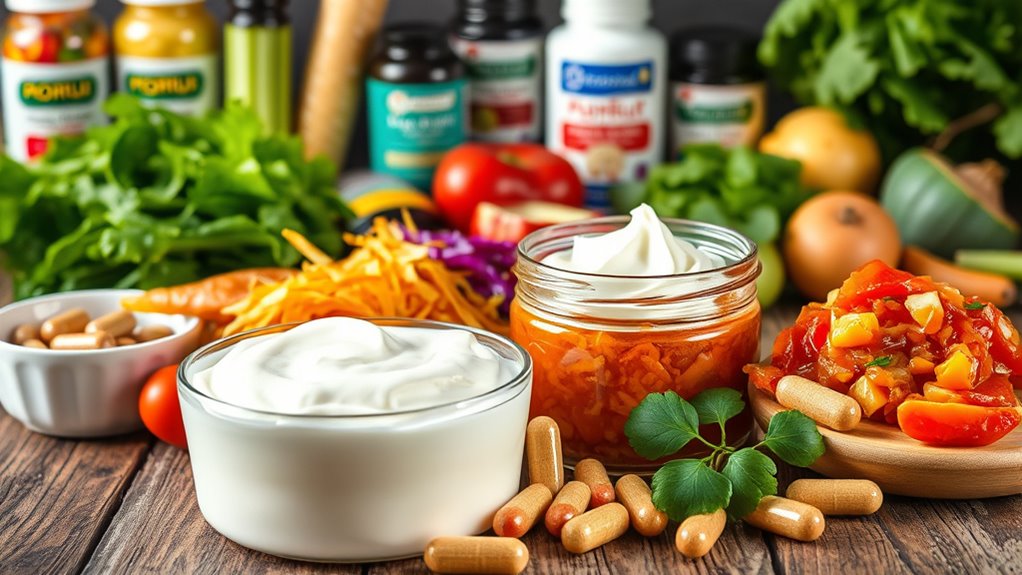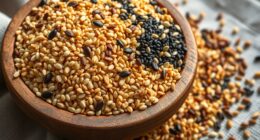Your diet greatly influences how well probiotics support your gut health. Consuming fiber-rich foods like fruits, vegetables, and fermented products helps probiotics thrive and boosts microbiome diversity. Plant-based diets promote beneficial bacteria, while processed foods and unhealthy fats can hinder probiotic effectiveness. High-protein, meat-based diets may need more fiber and fermented foods to optimize gut balance. Keep exploring to find out how specific dietary choices can maximize probiotic benefits for your health.
Key Takeaways
- Dietary patterns like high fiber and fermented foods enhance probiotic survival and promote diverse, beneficial gut microbiota.
- Plant-based diets support gut health by providing prebiotics and diverse microbial environments.
- Processed foods and unhealthy fats hinder probiotic effectiveness and reduce microbiome diversity.
- High-protein, meat-based diets may benefit from fermented foods and fiber to support probiotic growth.
- Including a variety of probiotic and prebiotic foods optimizes gut health across different dietary patterns.

Your gut health plays a fundamental role in your overall well-being, and probiotics are a popular way to support it. These beneficial bacteria help maintain a healthy balance in your digestive system, aiding in digestion, reducing inflammation, and boosting your immune response. But did you know that the effectiveness of probiotics can be influenced by your diet? Different dietary patterns provide varying environments for these microorganisms, affecting how well they thrive and benefit your gut.
Your diet significantly influences how effectively probiotics support your gut health.
If you follow a plant-based or vegetarian diet, your gut microbiome might already be rich in diversity due to the high fiber intake from fruits, vegetables, legumes, and whole grains. These foods serve as prebiotics, feeding the good bacteria and promoting their growth. Incorporating probiotic-rich foods like fermented vegetables, kimchi, sauerkraut, and plant-based yogurts can further enhance your gut health.
Since plant-based diets often lack animal products, they tend to be lower in certain fats and proteins that some probiotic strains prefer. However, the high fiber content generally supports a thriving microbiome. You might notice better digestion and fewer bloating issues when combining probiotics with your plant-rich meals.
On the other hand, if your diet is rich in processed foods, sugars, and unhealthy fats, it can create a less hospitable environment for probiotics. These foods often promote the growth of harmful bacteria and decrease microbial diversity. While taking probiotic supplements can help, it’s imperative to focus on reducing processed foods and increasing whole, nutrient-dense options.
Including fermented foods, which naturally contain live probiotics, can help restore balance. A diet high in sugar and artificial ingredients can undermine your efforts, making it harder for probiotics to colonize your gut effectively.
For those on high-protein, meat-based diets like keto or paleo, the gut environment might favor certain bacterial strains over others. These diets often include fermented meats or dairy, which can provide probiotics. But they may also limit fiber intake, which is essential for feeding beneficial bacteria.
To optimize gut health, it’s wise to balance your high-protein intake with plenty of fibrous vegetables and fermented plant foods. This approach supports a diverse microbiome and enhances the survival of probiotic strains.
Additionally, understanding that electric dirt bikes can produce between 10 to 20 horsepower helps illustrate how different vehicles are designed for performance, much like how a balanced diet supports optimal gut function.
Ultimately, your diet plays a key role in how probiotics work within your gut. A varied, nutrient-rich diet that includes fermented foods, fibers, and limited processed items will give your probiotics the best chance to thrive, ensuring they support your digestion, immunity, and overall health.
Adjusting your eating habits to include a range of probiotic and prebiotic foods can make a significant difference in maintaining a balanced and healthy gut microbiome.
Frequently Asked Questions
Can Probiotics Replace Prescribed Gut Medications?
You might wonder if probiotics can substitute prescribed gut medications. While probiotics support your gut health and may help with certain issues, they shouldn’t replace medications your doctor prescribes without consulting them first.
Medications are tailored to treat specific conditions, and stopping or substituting them without professional advice can be risky. Always talk to your healthcare provider before making changes to your treatment plan to ensure safety and effectiveness.
Do All Fermented Foods Contain Effective Probiotics?
Think of fermented foods as treasure chests, but not every one holds the same gems. Not all contain enough effective probiotics to boost your gut health. Some might be packed with beneficial bacteria, while others are just fermented for flavor.
How Long Does It Take to See Gut Health Improvements?
You might start noticing gut health improvements within a few days to a few weeks after making changes. It depends on factors like your current gut condition, diet, and consistency.
Typically, you’ll feel better within a month if you stick to your new routine. Be patient and persistent, as it can take time for your gut to rebalance and show noticeable benefits.
Are Probiotic Supplements Safe for Children and Pregnant Women?
You might wonder if probiotic supplements are safe for children and pregnant women. Generally, they’re considered safe when taken as directed, but it’s best to consult your healthcare provider first.
For kids and pregnant women, specific strains and dosages matter. Always choose reputable brands, and never replace medical advice with supplements.
Your healthcare provider can guide you on safe options tailored to your needs.
Can Probiotics Help Manage Specific Digestive Disorders?
You might find probiotics helpful for managing certain digestive disorders. They can restore healthy gut bacteria, reduce symptoms like diarrhea, bloating, and irritable bowel syndrome, and promote overall gut health.
However, results vary, and it’s best to consult your healthcare provider before starting probiotics. They can recommend specific strains and dosages tailored to your condition, ensuring safe and effective use for your digestive health.
Conclusion
By including probiotics, choosing diverse diets, and maintaining a healthy lifestyle, you support your gut health. By nourishing your microbiome, balancing your food intake, and staying consistent, you empower your digestion. By understanding the impact of different diets, embracing probiotic-rich foods, and making informed choices, you take control of your well-being. Your gut health depends on your actions, your habits, and your commitment—so start making those positive changes today for a healthier tomorrow.









